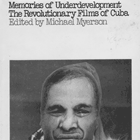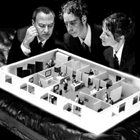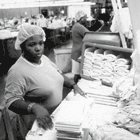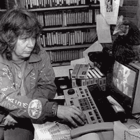Interview with Raymundo Gleyzer
by Tomas Gutierrez Alea
At the International Film Festival in Pesaro, Italy, 1973 (excerpts) .
I am an Argentinean filmmaker; I have made films since 1963, all of them about the political and social situation in Latin America. I try to demonstrate that there is only one way to bring profound structural changes to our continent: the socialist revolution. Like Che Guevara wrote: "the revolution must be socialist, if not, it is a parody of a revolution".
Our mission as revolutionaries and political filmmakers is to join the people's struggle, and to contribute what we can with our ideology. In my country, Argentina, it is impossible to make films inside the system because censorship reaches not only political films, but also all human relationships. That is why we prefer to make films outside the system, and show them to small groups of people. The fact that they are small is not important; last year in Cordoba, while the students took the University, "The Hour of the Furnaces" was being seen by 3,000 people. This is an exception, generally there is a group of 20 people, but in my opinion, it is better to communicate a clear idea to 20 people than confusing ideas to thousands, and that is what we would be doing if we worked for the system.
I would like to talk about my personal experience. There are many friends that we could call "progressives", fighting for socialism, or trying to, but always working individually, thinking about the problems of a real concientización and the place of the intellectuals in the people's struggle.
Many of them made films that we can call, in general Latin-American Cinema. From this experience, individually or in a group, nothing positive came out, and I include myself. This is because the fundamental problem, when we make a film, is the final spectator of the product. Everybody has thought about this problem; how to reach the base, the ordinary people, not only in theory, but also in the practice; to make films for the people, and the specific method to do it.
We could talk about theory forever, but the problem is how to reach a real person, the working class, the person getting sick in the factories, they deserve at least our support. From our own limits as middle class intellectuals, we have to contribute to their knowledge and send a clear message. We realized that we had to make contact with the base, with the people struggling every day in the streets. We did not have that contact.
In 1969, we saw the working class, on its own, subverting everyone; the military, the bureaucracy, the unions, and maybe we, if we did not changed our paternalistic attitude. Either we do not understand the working class, or we speak for its name without anybody asking us. It is a strategic mistake to separate ourselves from the people's struggle. It is worst yet for the intellectual that wants to contribute to the revolution.
I believe this is why the incorporation of a political organization is crucial, an organization with a concrete plan to achieve power. That is the revolutionary filmmaker's mission; if not, it is just talking. If not, we are just running our mouth.
I don't know if I am clear. At Cine de la Base, we spent several months trying to solve technical problems, we did not take care of anything else: just where to develop, where to edit, who was going to do this or that. Once these technical problems solved, we realized that our work as Cine de la Base would not be completed until we joined a specific political group, with a real plan to achieve power in Argentina. If not, we are not political filmmakers; we are dilettantes, separated from the people's national project.
What do we do at Cine de la Base, besides making and distributing the film The Traitors? We formed three divisions. The first two produce films and the third one is dedicated to the graphic materials. When one group produces, the other distributes, and vice versa. We think that to have our own theatres is very important, so, we are building small theaters, because the film is only finished with the spectator. If the film is clear and revolutionary in its ideology, we have to reach the people; we have to risk bringing them our work, just as we risked our lives filming it underground.
The cinema is an instrument of the bourgeoisie; it was created to serve this purpose. To watch a movie, we need a theater, a projector, etc. This condition makes it impossible to show a film in a factory, for the working class. We have not developed the means to use film as a working class tool. This is why we construct theaters, with any material available in the neighborhoods: wood, metal, etc. We already have a cinema for 200 people, and the name is "Cine de la Base". We plan to build 50 more, and this is crucial to have our own distribution channel.
Finally, when we say cinema is an instrument, we mean that the camera is not a military weapon, but a counter-information tool, that is the value of this type of cinema.
Back to Theory






